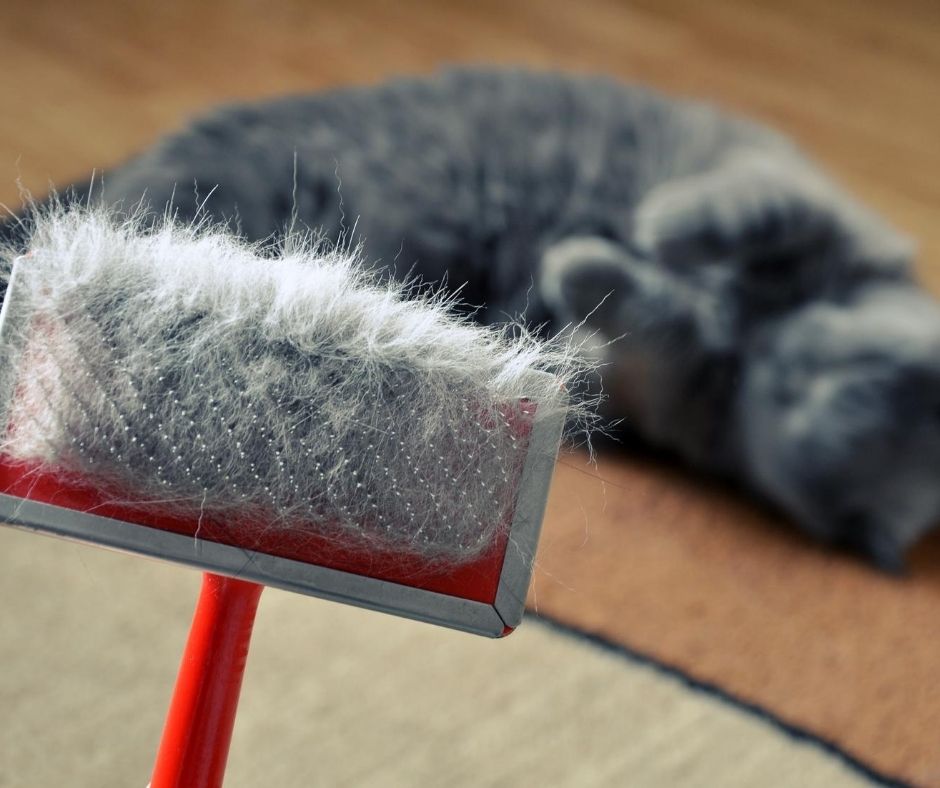Shedding in cats is natural and shouldn’t cause concern (as long as the Maine Coon doesn’t suddenly turn into a sphinx!). Cats lose their hair regularly and this is part of their nature. Occasionally, however, intense shedding occurs in situations that may be considered unusual for a cat to shed its fur. What should alert us? You will learn about it in our new article. So, all brushes, ready, steady…! 🙂
Why cats are shedding?
Cat’s hair, just like human hair, has a life cycle – from birth to death, which results in falling out. The replacement of the fur occurs regularly, and there are periods, when the shedding is simply more intense (this has to do with the change of seasons and adaptation for the different temperatures). In the colder months, before the fall-winter season, we can notice more hair in our pets (the so-called down hair) – the fur becomes thicker and softer, which is to protect the animal from the risk of hypothermia. In spring, cats lose their fur, because with the arrival of warmer months, they will no longer need unnecessary fur. So, seeing that a cat usually loses more hair in spring, we shouldn’t be surprised, because it’s a completely natural process.
Replacement of the fur, in the cycle described above, concerns to cats living in a temperate and cold climate (in the case of species that are exposed to major climatic anomalies in their natural environment, the hair replacement process may be slightly different, and species living in hot climates practically they aren’t covered with hair at all – only a thick lining protects them). Do you remember Justyna’s cats from the myKotty team, Kici and Bubu? These beautiful devon rexes don’t have much brushing! We have totally opposite situation with our Teddy and Kitku Yoda – the brush often glows bright red! 😉
Shedding anomalies
If your cat starts shedding during periods that aren’t related to the change of seasons, take a closer look at home conditions. Isn’t it too warm in winter and the perception of furry is disturbed and its hair falls out as it did before summer? Shedding will also look different, if the temperature in the rooms where the pet usually stays, is constant whole year – in such a situation, the pet will lose the same amount of hair all year round, so it’s worth preparing for it in advance and arming with a high-quality vacuum cleaner for special tasks!
Poor diet
If your cat starts molting in a unusual way, it could be a sign of poor nutrition and a lack of essential nutrients. To take care of your furry’s health, supplement its diet with the necessary vitamins and minerals (if you don’t know how to enrich your cat’s diet yourself, consult your veterinarian). A balanced diet is the basis, if the food doesn’t provide the necessary nutrients, it can always be supported with appropriate dietary supplements and preparations containing omega-3 acids, thanks to which the fur will be healthy, shiny and protected against excessive shedding.
Progressive disease
If, in addition to hair loss, you notice other disturbing symptoms in your cat (e.g. apathy, lack of appetite, drowsiness, problems with urination), be sure to visit a cat health specialist. Excessive shedding can be associated with a condition such as ringworm (hair loss and skin lesions). Likewise, symptoms can accompany diseases such as demodicosis or pruritus – if your cat is diagnosed with such a disease by a doctor – pharmacological treatment is necessary. It may also turn out that the cause of more intense hair loss is a cat’s hormonal disorders – in this case, the veterinarian’s help will also be necessary.
Parasites
Excessive hair loss may be be cause by parasites. We are talking about lice, for which cat’s hair and skin are a delicacy, and bloodsucking fleas. You can fight with these intruders, using special preparations to eliminate parasites from the cat’s body and its environment.
Food allergy
The cat may also shed excessively due to food allergies. If you suspect this is the case, check the composition of the prepared food and change the cat’s diet for a while to see if your cat has stopped shedding excess hair as a result of the change. If the problem persists, you may need to find another cause or consult a specialist.
Stress – fur’s killer
Sometimes shedding can be the result of an emotional disturbance. One of the factors that causes losing hair excessively is stress. In this case, it can be said that the hair is the “sensors” that signal any disease symptoms. A frightened cat can lose hair “massively” (you may have already noticed it, for example, during and after the furry’s visit to the vet). The thinning of the coat can be due to various reasons of stress – absence of cat caretaker, a barking neighbor’s dog, a new family member (also quadruped!). Anomalies will last until the source of stress disappears or the pet adapts to the conditions that previously caused this stress. In a situation where the unusual shedding still happens, and your pet exhibits other behaviors, indicating anxiety, the cause of which you are unable to locate, see a cat behaviorist who will help you to solve the problem.
Soon on our blog: Who’s the cat behaviorist? Stay with us!
The way to fight with the disease
There’s one more reason, when the condition of the cat’s fur may get worse. When your cat becomes sick, it may be so focused on dealing with the problem that it will begin to neglect the daily care of its coat, which becomes thin, dull and clumpy. The opposite tendency may also appear – the way to suffer a furry is to lick the sick area, sometimes even to the bare skin. This type of pet’s behavior should be alarming and increase our vigilance when it comes to monitoring the cat’s health.
As you can see, as long as nothing unusual happens, shedding shouldn’t be alarming, and only the described situations should increase our vigilance. In the case of regular shedding, armed with a suitable brush, a powerful vacuum cleaner and a spare time for cleaning, we have nothing to fear (the cat too, although some actually fear a vacuum cleaner;)).
How about you, fabCats? You’ve got your hands full or shedding go almost unnoticed in your cat? Let us know in the comments below!




